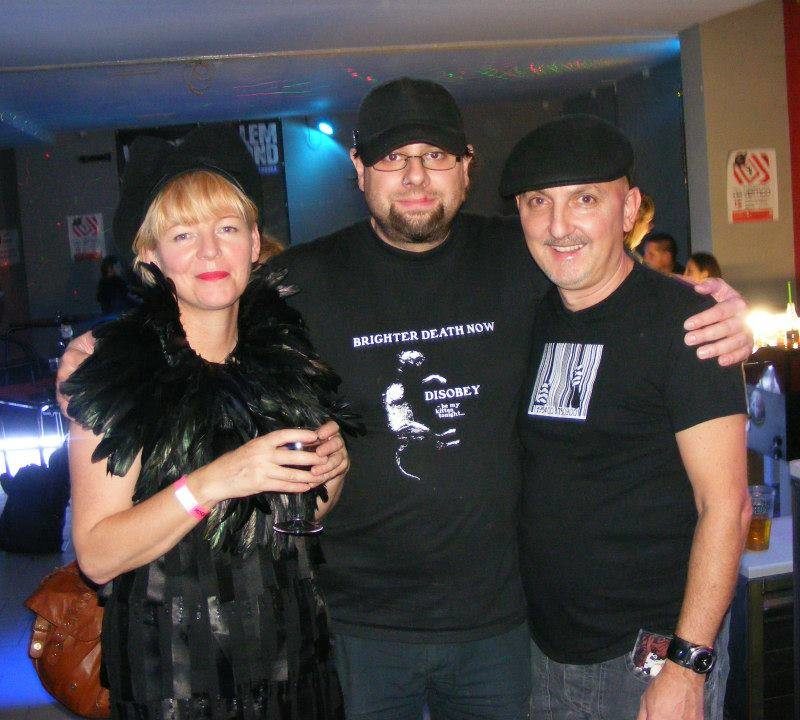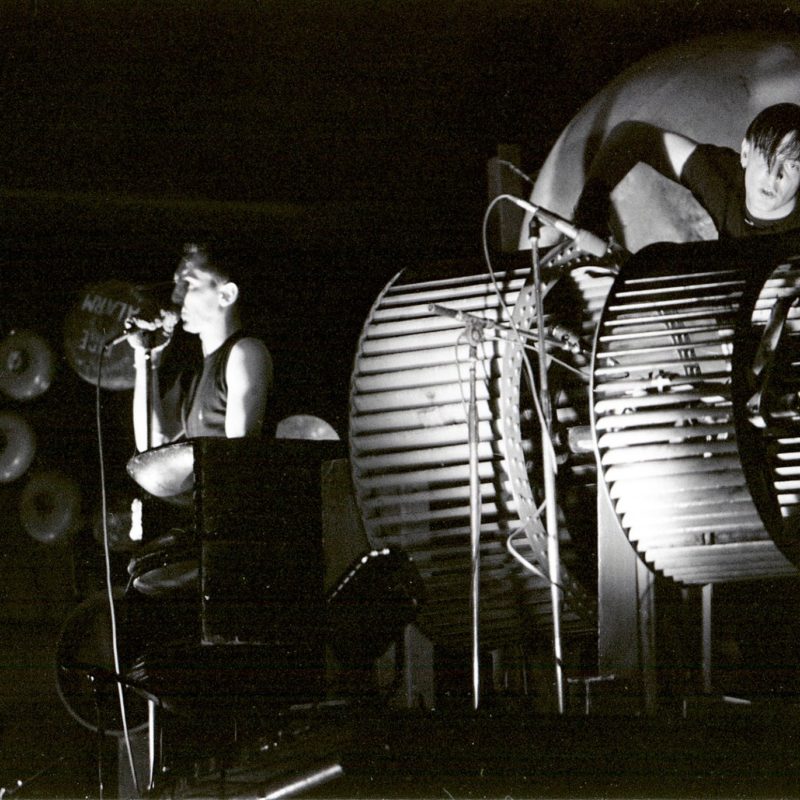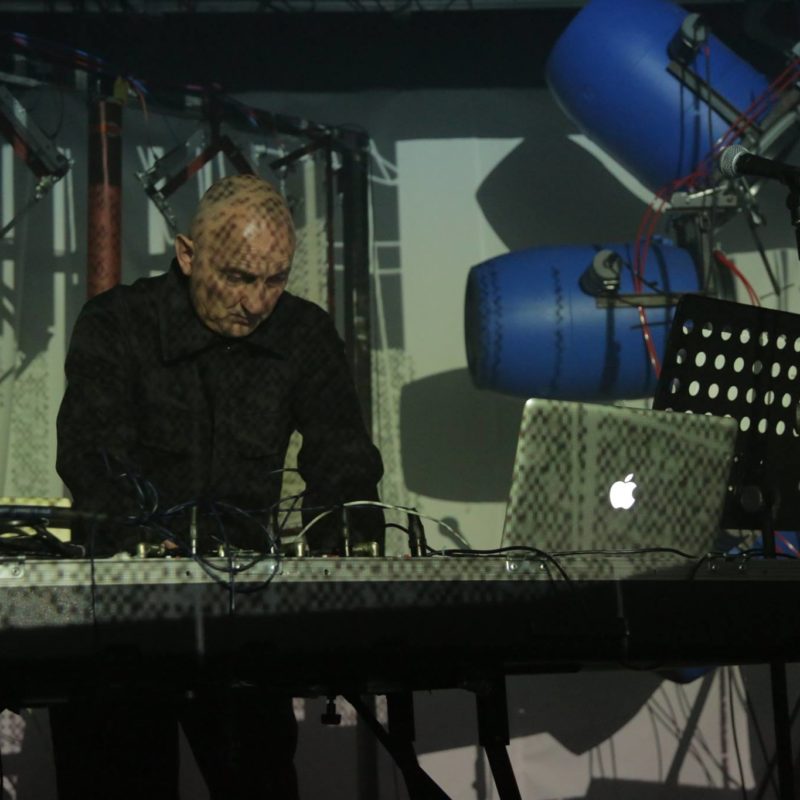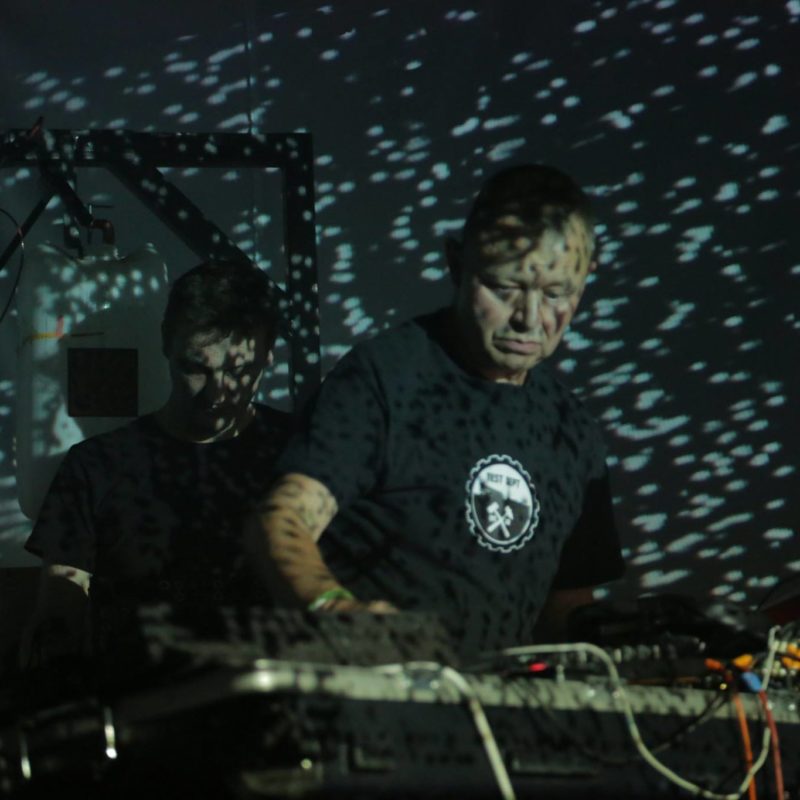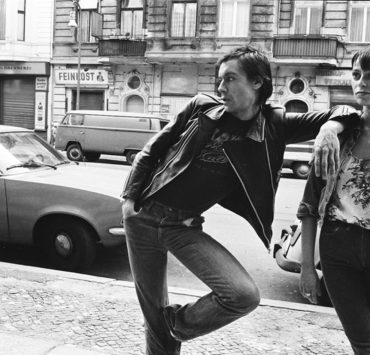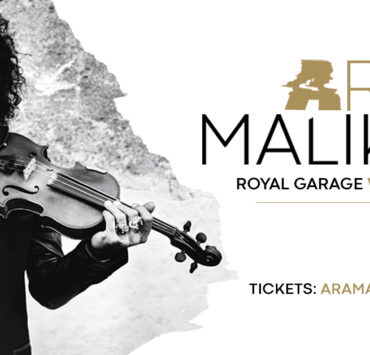TEST DEPT – Intervista alla band
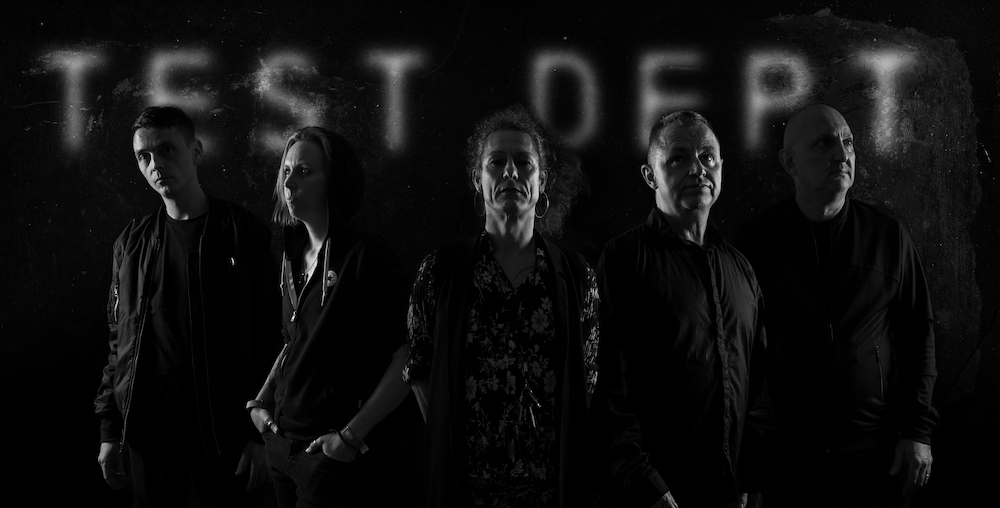
In occasione dei tre concerti che terranno in Italia a novembre, il 20 al Freakout di Bologna, il 21 al Circolo Magnolia di Milano e il 22 all’Hiroshima Mon Amour di Torino, ho intervistato Graham Cunnington e Paul Jamrozy della band storica industrial britannica Test Dept.
Ciao ragazzi, benvenuti su Tuttorock, posso dire che il vostro è stato un grande ritorno nel mondo della musica, il nuovo album “Disturbance” è molto bello, complimenti. Come va in generale?
Paul – È giusto tornare in questo punto critico della storia, esibirsi di nuovo e partecipare all’ambiente attuale, è un momento estremamente significativo per essere attivi con le voci estremamente polarizzate che si stanno facendo sentire nel Regno disunito, in Europa e in tutto il globo. È un disturbo che sembra aver colpito i nervi scoperti di molte persone, quindi è un buon punto di riconnessione, un continuum e un collegamento tra passato e futuro.
Siete reduci dal tour negli Stati Uniti, com’è andata?
Paul – È stato bello tornare negli Stati Uniti, abbiamo un forte seguito di vecchi fans che hanno atteso a lungo per vederci suonare di nuovo dal vivo e anche nuovi fan che si sono aggiunti dopo l’ascolto di Disturbance. Abbiamo ricevuto una fantastica accoglienza dappertutto ma il Chicago Cold Waves Festival ha superato ogni previsione con una sorprendente risposta da parte del pubblico. Viaggiare negli Stati Uniti è sempre un’avventura e un luogo stimolante in cui esibirsi, una volta superate le enormi disuguaglianze, il razzismo, i senzatetto e l’ignoranza che abbonda. Non abbiamo illusioni sul reale effetto che abbiamo sulla gente, ma è importante cercare di ispirare le persone, contrastare il capitalismo dilagante e le cazzate di Trump. Non ci siamo risparmiati e il pubblico ha risposto “No Trump, No KKK, No Fascists USA”.
Siete due dei fondatori della band, cosa avete fatto in questi 20 anni senza Test Dept?
Graham – Abbiamo avuto diversi progetti… Ho lavorato su colonne sonore per il teatro e la danza e su vari progetti cinematografici, nonché su montaggi, sia miei che di altri artisti. Ho anche scritto ed eseguito un monologo teatrale intitolato “Pain”, che ho portato in giro in tutta Europa. È stato prodotto dall’ex membro fondatore dei Test Dept Angus Farquhar, che era partito molto prima per lavorare al suo progetto di arte ambientale su larga scala, NVA. Sono anche diventato rappresentante sindacale e attivista di vari scioperi per lavoratori a basso reddito.
Paul – Ho lavorato molto nelle carceri lavorando a progetti creativi con detenuti. Ciò ha ispirato un progetto personale – C.3.3. – incentrato sui concetti di incarcerazione, e ha portato alla creazione della Ballad of Reading Gaol di Oscar Wilde, la Cacophonietta, un’interpretazione sonora del poema recentemente pubblicato da Cold Spring Records…
https://c-3-3.bandcamp.com/album/ballad-of-reading-gaol-the-cacophonietta
E i nuovi membri della band?
Paul – Abbiamo nuovi membri che ci hanno dato nuova energia. In un certo senso è un ritorno al suono più duro delle nostre radici industriali. Zel Kaute è una fantastica batterista donna, un metronomo umano con una grande abilità di improvvisazione, la potenza della batteria e i nostri sample vengono mescolati con più elettronica contemporanea dal vivo da parte di Greg Konrady (Ungheria), insieme a un mix polverizzante dubbed up PA dalla piattaforma FoH di Lottie Poulet (Francia) che ha lavorato con artisti come Throbbing Gristle e The Pop Group ed ha un pedigree sonoro importante. Tutto questo è incapsulato in un nuovo mix visivo reattivo audio che abbraccia sia immagini vecchie che nuovi filmati di David Altweger (Austria). Quindi abbiamo una concezione veramente europea.
Avete sempre parlato dei problemi della società e delle classi operaie, la situazione generale è peggiorata rispetto agli anni ’80 quando avete iniziato a suonare?
Paul – Sì, la situazione continua a peggiorare per la maggior parte della gente comune, il divario tra i cittadini più ricchi e quelli più poveri continua ad allargarsi con una maggiore deregolamentazione generale se la Brexit va avanti, è difficile vedere come le cose potranno migliorare in termini di servizi pubblici, edilizia, salari e condizioni di lavoro. Tuttavia, le elezioni sono all’orizzonte e speriamo di sbarazzarci di Boris Johnson e dei Tories e vedere alcuni cambiamenti sociali positivi, ma al momento il paese è molto diviso e le persone sono legate alla Brexit e all’idea di “riprendere il controllo”. In realtà ci stanno vendendo ad un agghiacciante libero scambio “Trumpiano”.
Farete ancora spettacoli volti ad aiutare le classi inferiori come quando avete aiutato i minatori nello sciopero storico del 1984/1985?
Paul – Forse ti sei perso con la traduzione, ma non classificherei mai le persone come classi inferiori, vorrebbe dire che esiste una classe superiore, c’è sicuramente chi ci crede e sente un senso di diritto alla ricchezza e al potere.
Graham – Lo sciopero dei minatori ha risuonato con noi allora e ancora ora, ed è ancora rilevante in quanto segna il momento in cui il consenso liberale postbellico ha finalmente iniziato a essere completamente spezzato; quando la libera economia neoliberista del libero mercato è stata pienamente attuata. Lo sciopero dei minatori è stata la campagna cardine nel Regno Unito, l’ultima grande resistenza all’introduzione del sistema di avidità individuale e aziendale che ha portato, negli anni successivi, al disordine politico, sociale e ambientale di oggi. La Thatcher sapeva che, se avrebbe potuto spezzare i minatori, avrebbe potuto spezzare i sindacati e in seguito consentire l’implementazione dell’egemonia aziendale e diminuire i diritti dei lavoratori. Questo modello si è successivamente diffuso in gran parte del globo.
Paul – Ovviamente continueremo a sostenere le cause in cui crediamo e la traccia GBH84 è dedicata alla campagna “Orgreave Truth and Justice” sul trattamento dei minatori e il processo screditato dopo la “Battaglia di Orgreave” nel 1984 tra polizia e minatori. Le forze di polizia del South Yorkshire sono anche la stessa forza responsabile della tragedia di Hillsborough. La traccia fa riferimento al potente libro “GB84” di David Peace, che è un romanzo sulla coercizione e la corruzione delle autorità nello Yorkshire durante il periodo dello sciopero. Alcuni ulteriori dettagli possono essere trovati qui:
Lo sciopero dei minatori risuona ancora, certamente al nord. La Gary Clarke Dance Company ha appena usato parte della nostra musica in un nuovo lavoro potente ed emozionante che ripercorre gli scioperi dei minatori attraverso la cultura rave che sorse nelle fabbriche e negli spazi de-industrializzati del Regno Unito negli anni ’90. La società proveniva da un’ex comunità mineraria.
https://wastelandtour.co.uk/the-show/wasteland/
Che ricordi avete del 1990 quando suonaste in una fabbrica occupata a Bologna? Siete tornati in questa città 4 anni fa e tornerete di nuovo il 20 novembre.
Paul – L’Italia e la Città Rossa Bologna in particolare, in quanto luogo del nostro primo spettacolo italiano, sono sempre state di grande supporto e speciali per noi. Abbiamo una lunga storia nell’organizzazione di eventi e nel suonare in spazi alternativi, ove possibile, e l’Italia con la sua forte scena politica e i suoi centri sociali ci ha sempre dato grandi possibilità di esibirci al di fuori del normale circuito. Dallo stabilimento di Bologna a una cava di sabbia a Polverigi, sul fianco dell’Etna e, naturalmente, a Santarcangelo a Mutonia.
Qual è la differenza tra la scena industrial degli anni ’80 e quella di oggi?
Paul e Graham – Siamo stati citati semi seriamente come l’unica vera band industrial in quanto siamo gli unici che hanno collaborato con lavoratori industriali come gli Striking Miners nel Regno Unito e quell’esperienza ha forgiato quell’immagine di noi nella nostra estetica e identità. Ci siamo sempre opposti all’idea di industrial che consideriamo come una categorizzazione ristretta guidata dai media e vediamo le cose in una luce molto più ampia. Abbracciamo sicuramente quel fantastico periodo di creatività post-punk che ha generato un movimento “industrial”, ma ci sono enormi differenze con gruppi come i nostri coetanei Throbbing Gristle (che furono ovviamente i primi a coniare il termine “musica industrial per gli industriali). L’industrial oggi è un ampio spettro di suoni dal puro noise fino all’EBM e oltre. Penso che i Test Dept provengano da un’eredità molto europea di suono ricercato, sperimentazione elettronica, avanguardia classica e estetica del rumore con un pesante rullo di tamburi tribali e un occhio all’ex blocco orientale. Penso che una scena sia un crogiolo di sottoculture, il che non è un male perché ha il potenziale per muoversi piuttosto che attenersi rigidamente all’ideale degli anni 80. Oggi sicuramente la techno ha molta influenza sonora su alcuni sottogeneri come hip-hop e grime (anche se inconsapevolmente). In America dilagano di più il metal e il noise, in Europa il tutto è indirizzato forse più verso una punta sperimentale e d’avanguardia abbracciato dalla comunità gotica. Certamente il nostro pubblico appartiene ad un’arena più politica e sovversiva.
Vi divertite ancora a trovare oggetti metallici e strumenti di lavoro per produrre suoni?
Paul – Abbiamo abbracciato l’elettronica software e hardware e abbiamo cercato di collegarli all’allestimento percussivo dal vivo, che utilizza ancora materiali di scarto provenienti da ciò che ci circonda, anche se in un nuovo formato e, speriamo, eccitante. La ferraglia stessa non è così rilevante come fornitore di suoni dominante; oggi ha un punto di riferimento diverso, in relazione a ciò che ci circonda, ai giovani che non sono cresciuti con la fine del settore manifatturiero e la distruzione delle sue infrastrutture (almeno nel Regno Unito). Oggi i pezzi di ricambio sono il più delle volte apparecchiature elettriche defunte e la ferraglia è probabilmente diventata più preziosa a causa della sua scarsa reperibilità. Trovare cose non è così facile, è più facile cercare su eBay.
Dopo il tour europeo, scriverete qualcosa di nuovo?
Paul e Graham – Sì, inizieremo a lavorare su nuovo materiale, ma il prossimo anno ci concentreremo in gran parte sui nostri vecchi lavori e sulle rielaborazioni del materiale preso dal nostro archivio. Abbiamo alcuni altri progetti ma sono ancora all’inizio.
Grazie mille, volete dire qualcosa ai lettori di questa intervista e a quelli che vedranno i vostri tre concerti in Italia (P.S. Ci vediamo a Bologna, ci sarò)?
Paul e Graham – Ci vorrà un grosso sforzo da parte di coloro che si oppongono all’attuale direzione politica globale per cambiare questo periodo nella nostra storia, in modo che possiamo ancora una volta guardare a una visione più ampia del mondo, cercando di affrontare le criticità della povertà, del corporativismo e dei cambiamenti climatici e affrontare le vere cause dello squilibrio di oggi. Dobbiamo dire la verità al potere, protestare ove necessario ed eleggere coloro che si impegneranno a guidare questi cambiamenti positivi. Riteniamo che la strumentazione e le nuove performance che porteremo in Italia rappresentino la parte più potente dei Test Dept. Partecipate ai nostri eventi, non rimarrete delusi.
MARCO PRITONI
** ENGLISH VERSION **
On the occasion of the three concerts that will be held in Italy in November, the 20th at the Freakout in Bologna, the 21th at the Circolo Magnolia in Milan and the 22nd at the Hiroshima Mon Amour in Turin, I interviewed Graham Cunnington and Paul Jamrozy of the British industrial historical band called Test Dept.
Hello guys, welcome to Tuttorock, I can say it was a great return to the world of music, your new album called “Disturbance” is very nice, congratulations. How’s it going in general?
Paul – It feels right to be back at this critical point in history, to be performing again and participating in the current environment, an extremely significant time to be active with the hugely polarized voices that are making themselves heard in the disunited Kingdom, Europe and across the globe. Disturbance seems to have hit a raw nerve with many people so it is a good reconnection point, a continuum and link from the past to the future.
You are back from the US tour, how did it go?
Paul – It was good to return to the US we have a strong hardcore following that had waited a long time to see us play again live and also new fans who have picked up on the Disturbance album. We received a fantastic reception everywhere but Chicago Cold Waves Festival topped it with an amazing response from the audience. Travelling to the US is always a real life adventure and an inspiring place to perform, once you get beyond the huge inequalities, racism, homelessness and uneducated ignorance that abounds. We have no illusions about the real effect we have but its important to try and inspire people, to counter the rampant capitalism and the Trump bullshit. We pulled no punches on this agenda and the audience responded “No Trump, No KKK, No Fascists USA”.
You are two of the founders of the band, what have you done in these almost 20 years without Test Dept?
Graham – We had various different projects going on…
I worked on soundtracks for live theatre and dance and on various film projects, and also on installations – both my own and with other artists. I also wrote and performed a one person theatrical performance entitled ‘Pain’, which performed across Europe. It was produced by former TD founder member Angus Farquhar, who had left much earlier to work on his own large-scale environmental arts project, NVA. I also became a union rep and activist on various strikes for low-paid workers.
Paul – I did a lot of work in prisons working on creative projects with prisoners. It inspired a personal project – C.3.3. – which focuses on concepts of incarceration and led to the creation of Oscar Wilde’s Ballad of Reading Gaol, the Cacophonietta, a sonic interpretation and rendition of the poem recently put out by Cold Spring Records…
https://c-3-3.bandcamp.com/album/ballad-of-reading-gaol-the-cacophonietta
What about the new members of the band?
Paul – We have new members that have given us new energy and focus. In some ways it is a return to a harsher sound of our industrial roots. Zel Kaute, is a fantastic female drummer a human metronome with great improvisational ability, the power of the drums and our metal and sampled trigger percussion are mixed with more live contemporary electronics from Greg Konrady (Hungary), along with a pulverising dubbed up PA mix from the FoH desk from Lottie Poulet (France) who has worked with artists such as Throbbing Gristle and The Pop Group a serious sonic pedigree. This is all encapsulated within a new audio reactive visual mix that embraces both archive and new footage from David Altweger (Austria). So we are a truly European conception.
You have always talked about problems in society and about the working classes, has the general situation worsened compared to the 80s when you started playing?
Paul – Yes the situation continues to worsen for most ordinary people, the gap between the wealthiest and poorest citizens continues to widen with more deregulation on the way if Brexit goes ahead, it is difficult to see how things will improve in terms public services, housing, wages and working conditions. However an election is on the horizon and we hope to be rid of Boris Johnson and the Tories and see some positive social change but the country is very divided at present and people are being conned with Brexit and the idea of “taking back control”. In reality we are being sold out to a potential Trumpian free trade nightmare.
Will you still do shows aimed at helping the lower classes such when did you help the miners in the historic strike of 1984/1985?
Paul – Maybe lost in translation but I would never classify people as lower classes, that is to suggest that there is a superior class, there are certainly those who believe that, and who feel a sense of entitlement to wealth and power.
Graham – The Miners’ Strike resonated with us then and now, and is still relevant as marking the moment when the post-war liberal consensus finally started to be fully broken apart; when the uninhibited neoliberal free-market economy could be fully implemented. The Miners’ Strike was the pivotal campaign in the UK, the last great resistance to the introduction of the system of individual and corporate greed which has led, over the subsequent years, to todays political, social and environmental mess. Thatcher knew if she could break the miners, she could break the unions and thereafter allow the implementation of corporate hegemony and diminished workers’ rights. This model subsequently spread across much of the globe.
Paul – Of course we will still support causes that we believe in and the track GBH84 is dedicated to the Orgreave Truth and Justice Campaign about the treatment of miners and the discredited trial after the ‘Battle of Orgreave’ in 1984 between police and miners. The South Yorkshire Police Force are also the same force that were responsible for the tragedy of Hillsborough. The track references the powerful book ‘GB84’ by David Peace, which is a novel about coercion and corruption of the authorities in Yorkshire during the period of the strike. Some further background can be found here:
The Miners Strike still resonates, certainly in the north. The Gary Clarke Dance Company just used some of our music in a powerful and emotional new work which traces the Miners strike through to the rave culture that arose in de-industrialized factories and space around the UK in the 90’s. The company came from a former mining community.
https://wastelandtour.co.uk/the-show/wasteland/
What memories do you have of 1990 when you played in a occupied factory in Bologna? You came back to this city 4 years ago and you will come back again on November 20.
Paul – Italy and the Red City Bologna in particular, as the site of our first ever-Italian show has always been strongly supportive and special to us. We have a long history of organizing events and playing in alternative spaces wherever possible, and Italy with its strong political scene and social centers has always given us great possibilities to perform in outside the normal circuit. From the factory in Bologna to a sand quarry in Polverigi, on the side of Mount Etna and of course in Santarcangelo at Mutonia.
What is the difference between the 80s industrial scene and today’s one?
Paul and Graham – We have been quoted semi seriously as saying we are the only true industrial band as we are the only ones that collaborated with industrial workers such as the Striking Miners in the UK and forged that experience into our aesthetic and identity. We have always opposed the idea of industrial as a media driven narrow categorization and see things in a much broader light. We certainly embrace that amazing period of post-punk creativity that spawned an ‘industrial’ movement, but there are huge differences with groups such as our peers, Throbbing Gristle (who were of course the first to coin the term “Industrial music for industrial people”). Industrial today is a wide spectrum of sound from pure noise through to EBM and beyond. I think TD come from a very European heritage of found sound, electronic experimentation, the classical avant-garde and noise aesthetic with a heavy load of tribal drums thrown in for good measure and an eye to the former Eastern Bloc. I think if there is a scene it is a melting pot of sub cultures, which is not a bad thing as it then has potential to move rather than stick rigidly to some 80,s ideal. Nowadays it certainly spans techno in a big way and is a sonic influence on some hip-hop and grime sub genres (if unknowingly). In America it touches more on metal and noise, in Europe possibly more on an experimental, avant-garde tip and is embraced by the gothic community. Certainly our audience also crosses into a more political and agitational arena as well.
Do you still have fun finding metal objects and work tools to produce sounds?
Paul – We have embraced both software and hardware electronics and tried to link them into the live percussive set-up, which still uses cast-off materials from our surroundings, albeit in a new, and, we hope, exciting format. Scrap metal itself is maybe not so relevant as a dominant sound provider; it has a different reference point today, in relation to our surroundings, and to younger people who didn’t grow up with the demise of manufacturing industry and the breaking down of its infrastructure (in the UK at least). Today the cast-offs are more often than not defunct electrical equipment and the scrap metal has probably become more valuable due to its relative scarcity. It is not so easy to find stuff, it is easier to search on EBay.
After the European tour, will you write something new?
Paul and Graham – Yes we will start to work on new material but next year will focus largely on re-releasing our back catalogue and re-workings from our archive. Some other projects in the pipe line but early days.
Thank you very much, do you want to say something to the readers of this interview and to those that will see your three concerts in Italy (P.S. See you in Bologna, I will be there)?
Paul and Graham – It will take a concerted effort by those who oppose the current global political direction to shift this period in our history, so we can once again look to a bigger world-view, which looks to tackle critical issues of poverty, corporatism and climate change and address the real causes of todays imbalance. We need to speak truth to power, protest where necessary and elect those who will commit to driving through these positive changes. We feel that the set up and new performance we will bring to Italy is a strong echo of Test Dept at their most forceful best. Come and participate in this happening you will not be disappointed.
MARCO PRITONI
Sono nato ad Imola nel 1979, la musica ha iniziato a far parte della mia vita da subito, grazie ai miei genitori che ascoltavano veramente di tutto. Appassionato anche di sport (da spettatore, non da praticante), suono il piano, il basso e la chitarra, scrivo report e recensioni e faccio interviste ad artisti italiani ed internazionali per Tuttorock per cui ho iniziato a collaborare grazie ad un incontro fortuito con Maurizio Donini durante un concerto.




